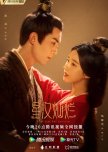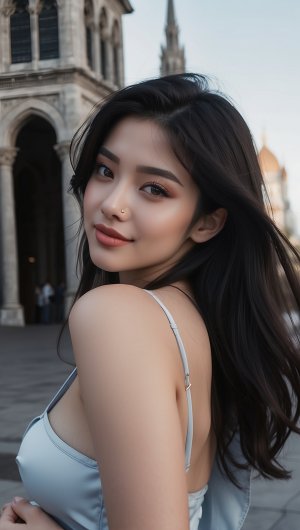
Esta resenha pode conter spoilers
An Emotional Rollercoaster Worth Riding
This drama grabs you from the first scene and refuses to let go, keeping your heart racing long after the credits roll. It’s the kind of story that leaves fingerprints on your soul.Duan Wu: She’s a force of nature. Fierce, street-smart, and unshaken by challenges—yet there’s a vulnerability in her innocence about life beyond the pearl farm. She’s the girl who punches first and figures out the rest later, and honestly, it works. Hardworking and fearless, but not invincible, her flaws make her real and relatable. Watching her grow into someone even stronger, someone more aware and mature, yet still kind at her core—it’s a transformation so raw and profound, it’s like witnessing a pearl form under pressure.
Yan Zi Jing: Oh, the layers. He’s sharp, complex, and burdened by a past that’s as heavy as it is painful. Living in the grey areas of morality, he’s ruthless when he has to be but still clings to shreds of humanity, refusing to lose himself completely. He’s the guy who looks ridiculously good while taking down enemies and even better while side-eyeing the FL’s stubbornness. A total tsundere, he pretends to be indifferent but sees her in ways that matter. His evolution? Breathless. Watching him rediscover his humanity and love is mesmerizing.
Zhang Jin Ran: The unsung hero. Kind, optimistic, and oh-so-easy to root for. He’s the guy who holds up the light in a dark world, even when it flickers. His hero complex might annoy some, but it’s laced with such genuine care that you can’t help but adore him. His journey from idealistic to grounded is realistic. Honestly? One of the best-written second leads.
Antagonists and Villains: Deliciously dark and grey. The kind that get under your skin, making you rage one second and admire their complexity the next. A perfectly woven balance of evil and intrigue. With a few wicked redemption arcs thrown in.
Acting: Zhao Lusi’s growth as an actress is evident; she’s more captivating than ever here. Her abilities are stronger, more powerful, and stable throughout the drama. She’s mesmerizing, with her emotions hitting you like tidal waves—raw, beautiful, and unrelenting. First time watching Liu Yuning, and he’s impressive—he brings believable subtle emotions and totally owns a tortured, morally grey character that is borderline red flag. His quiet intensity and tortured eyes carrying so much weight, you feel it in your chest. And Tang Xiaotian? Solid and nuanced, keeping his character compelling without overshadowing.
Plot: Fast-paced and brutally real. It’s a story that isn’t afraid to dive into the shadows—exploring slavery, resilience, and redemption with unflinching honesty. The imagery is vivid and unforgettable, lingering like a bittersweet echo. At its heart, it explores the unbreakable bonds of family—the ties that anchor us, but also the ones that weigh us down when love and revenge collide. It’s about a love so deep and unwavering it defies logic, carving through pain and misunderstandings to prove that sometimes, love is not just a feeling but also a choice. Betrayals cut like knives, their sting magnified by the trust that preceded them, and redemption feels hard-earned—messy, imperfect, and profoundly human. This isn’t just a tale of good versus evil; it’s a reflection of life’s grey areas, where the lines between right and wrong blur, and every choice carries a price.
Chemistry: Fire. Between the Duan Wu and Yan Zi Jing, it’s charged with simmering heat, the kind that makes you lean closer to the screen. And with the Zhang Jin Ran, it’s tender and heartwarming. Even the bromance between Yan Zi Jing and Zhang jin Ran was heartwarming. Lusi and Yuning’s connection, obvious and through the roof. Yuning's eyes are so expressive and matches Lusi's intensity. Their height difference? Dreamy. Their comfort with each other brings every romantic scene to life in a way that feels seamless and positively electric.
Cinematography & OST: A feast for the senses. Stunning visuals set the tone, and the music? Hauntingly beautiful, amplifying every emotion.
In short: This drama doesn’t just tell a story—it pulls you into its world, holds your heart hostage, and leaves you grateful for the experience. Watch it. Feel it. Love it.
PS:
The ending made every moment precious and worth it. A Walk to Remember left a lasting impression on me, but The Story of Pearl Girl takes it a step further, its finale is unforgettable. Duan Wu and Yan Zi Jing were dealt some of the harshest cards in life, yet they played them with fierce determination. They didn’t just survive, they lived and loved with all they had, defying every hardship thrown their way.
In the end, their dreams weren’t just fulfilled; they were brought to life in each other’s embrace. Their time together may have been fleeting, but it was luminous, filled with memories that eternity itself couldn’t erase. Their story showed something profound: life is brief, fragile, and unpredictable. But in the moments we do have, we can choose to love deeply, live boldly, and create something timeless. Duan Wu and Yan Zi Jing didn’t just exist - they made every second count.
Esta resenha foi útil para você?

Hidden Love Uncovered My Heart!
If "Hidden Love" were a dessert, it would be a triple-layered chocolate cake with a surprise caramel center—utterly delightful and irresistibly sweet!From the moment the opening theme song started, I knew I was in for a treat. This drama serves up romance with a side of humor and a sprinkle of heartwarming moments. The chemistry between the leads is so palpable, you'd think they invented chemistry just for them!
Zhao Lusi's interpretation of Sang Zi is on point. She's the perfect mix of adorable and fierce, like a kitten with a really good punchline. Superb acting talent that invariably draws the viewers emotions. Chen Zhe Yuan's portrayal of Duan Jia Xu is dynamic. With his smoldering looks and secret soft side, had me swooning by episode two.
The plot is like designed by Cupid himself. Just when you think you have it all figured out, bam! Another revelation that makes you fall in love with the characters even more.
The supporting cast is equally fantastic. Every friend, family member, and even the occasional frenemy adds layers to this already rich story. Special shoutout to Victor Ma as Sang Yan, the hilarious brother/best friend— where can I find one of those in real life?
But what really sealed the deal for me was the ending. No spoilers, but let's just say I hugged my pillow and happy-cried like it was the finale of my favorite reality show.
"Hidden Love" is the perfect binge-watch. It’s got laughs, it’s got tears, it’s got romance that’ll make you believe in fairy tales again. It reminded me of my first crush, first love, and the special journey of being in love. So grab your popcorn, tissues, and maybe a pillow to hug—you’re going to need it!
Esta resenha foi útil para você?

Esta resenha pode conter spoilers
A Tale of Promise Tamed by Perfection
A Dazzling Beginning:Blossoms in Adversity opens with an arresting visual: the young female lead braving the storm to scale a ship's mast, her courage and intelligence illuminated by flashes of lightning. This moment, while pushing the boundaries of believability, sets a tone of resilience and brilliance that promises a tale steeped in struggle and triumph. It hints at a protagonist whose determination could anchor a profound exploration of personal and societal challenges, inviting viewers to root for her against an unforgiving world.
The narrative gains momentum with the sudden unjust downfall of a prestigious scholarly family, orchestrated by a paranoid emperor whose cruelty spares no one. This theme—a stark depiction of the fragility of life under unchecked power—provides a powerful foundation. Alongside this turmoil emerges the male lead, an experienced and commanding figure whose strength and brilliance sharply contrasts the vulnerability of those crushed under tyranny. The drama’s setup brims with potential: a stage set for examining societal injustice, resilience, and the tenacity of women confronting systemic oppression.
A Faltering Depth:
As the series unfolds, however, its initial ambition succumbs to a preference for lighter, more idealized storytelling. The weighty themes of patriarchal oppression, abuse, forced labor, and complex family dynamics are sidelined in favor of feel-good emotional resolutions that often skim the surface of these complex issues. The treatment of domestic abuse, for example, simplifies the narrative into a moral dichotomy between the “good” sister, Hua Xian, and the “evil” sister, Hua Jing, failing to grapple with the nuanced realities of such trauma.
While these surface-level lighter moments may offer comfort and entertainment, they often diminish the gravity of the injustices the story seeks to portray. For viewers hoping for a thoughtful examination of systemic struggles, this approach may feel unsatisfying. That said, the series does occasionally return to its darker realistic roots, particularly in the tragic arc of Hua Rong and her unborn child, which serves as a haunting reminder of human fragility in the face of relentless oppression.
The Cost of Perfection: A Heroine Without Shadows
Zhi, the central figure of dazzling capability, is positioned as a beacon of female empowerment, yet her portrayal veers into idealization. While her intelligence, ingenuity, virtue and bravery are admirable, they are often depicted with an infallibility that robs her character of vulnerability and limits her capacity for growth. Dubbed the "Goddess of Wealth," she can accumulate wealth and business quickly, argues like a seasoned lawyer, deduces like a master physician, and fights like a warrior born. She saves the male lead with Mulan-like flair, navigates ships with unparalleled skill, and wield her wrist weapon with unerring accuracy, eyes closed. These accomplishments read more like a checklist of superhuman feats than the journey of a complex, evolving character.
In striving to present Zhi as a flawless heroine, the narrative sidesteps the raw, messy imperfections that make stories of resilience truly resonate. Her struggles lack personal consequences, and even her moments of hardship are reframed as the fault of others. This absence of vulnerability and growth renders her distant, a symbol of empowerment that feels more aspirational than authentic.
Moreover, Zhi’s oppressive upbringing, a storyline ripe for exploring themes of resentment, healing, and self-discovery, is only superficially addressed. This missed opportunity underscores the series’ reluctance to delve into the profound emotional and psychological layers of its protagonist, opting instead for a polished portrayal that ultimately feels hollow to me.
Secondary Characters Shine:
The drama finds its heart not in Zhi’s perfection, but in the flawed, relatable arcs of its supporting cast. Characters like Shaoyao, whose journey is imbued with genuine growth and raw humanity, stands out as an emotional core of the narrative. Lu Yuxiao's impressive portrayal of Shaoyao carries an emotional weight that grounds the series in authenticity. I loved her character.
Similarly, the dynamic between Shen Huan and Shaoyao provides a refreshing counterpoint to the idealized main romance. Their relationship, marked by conflict, reconciliation, and mutual respect, feels natural and earned—a testament to the power of nuanced storytelling. Their love story, vibrant and authentic, shines with emotional depth and relatability.
A Male Lead Diminished by the Spotlight on Perfection
Gu Yanxi, portrayed by Hu Yitian, offers glimpses of a compelling character, particularly in his role as a commander navigating palace intrigue and personal loyalties. Yanxi is introduced with promise: a sharp, strategic mind navigating intrigues, familial dysfunction, and a manipulative, obsessive emperor. His fight scenes are a visceral highlight, showcasing raw physicality and intensity. His potential for depth is evident in his conflicted relationships with those around him. Yet, in the middle of the plot, Yanxi’s potential is often overshadowed by the narrative’s insistence on Zhi’s unerring competence and brilliance.
While his interactions with the emperor hint at deeper inner conflicts—loyalty, affection, and moral ambiguity—these threads remain underexplored. Yanxi’s character is too often relegated to a supporting role in Zhi’s orbit, his agency diminished and his arc stunted. His role becomes largely reactive, his strategic acumen sidelined to elevate hers. The romantic chemistry between the leads suffers as a result, with their interactions lacking the tension and emotional complexity necessary for a compelling connection. Their relationship, framed as a fairytale of perfect communication and trust, feels idealized to the point of detachment. When conflicts arise, they are resolved with little emotional fallout, leaving their dynamic static and unrelatable. Zhi makes all the relationship decisions, whether to end it or get back together. No deep relatable angst, which will delight the fans who prefer light-hearted Hallmark type romance. A fairytale romance from start to finish.
However, in my view, their interactions, while visually sweet and cute, lack the tension and emotional complexity necessary to sustain a meaningful connection. Lingering gazes and long embraces often feel staged rather than organic, with awkward gaps in physicality detracting from the authenticity of their relationship.
Narrative Crutches and Missed Opportunities:
The use of voiceover narration of the leads inner thoughts, mostly during the first half of the series, further weakens the drama’s impact. Instead of trusting the actors to convey internal struggles and revelations through performance or allowing the audience to infer meaning from nuanced dialogue, the series resorts to spoon-feeding thoughts and emotions. This choice undermines character complexity and reduces my engagement, turning potentially profound moments into shallow expositions. I don't enjoy an overuse of first person pov narratives in the middle of the plot.
The Tale That Could Have Been:
Despite its flaws, Blossoms in Adversity is not without merit. The supporting cast breathes life into the story, and the soundtrack enhances its emotional resonance. Yet, the drama's insistence on idealization—particularly of its lead—hampers its ability to delve into the raw, messy realities that transforms good stories into great ones.
Zhi's brilliance and her triumphs were entertaining in its moments, even if her perfection becomes her greatest flaw, a barrier to relatability and growth. Yanxi’s potential for nuance was stunted in her shadow, but eventually shone brighter in the last episodes.
For viewers seeking light-hearted escapism where triumphs come swiftly, the series delivers an enjoyable experience - a warm breeze of comfort and predictability. But for those yearning for a story that lingers, one that mirrors the raw edges of life and resonates in its aching moments of growth, it serves as a reminder of the power of imperfection in storytelling. Flaws, vulnerabilities, and struggles are not weaknesses—they are the roots from which the most memorable stories blossom.
Esta resenha foi útil para você?

"Love Like the Galaxy": Stellar Drama of Love, Betrayal, Redemption, and Triumph!
Watching 'Love Like the Galaxy' was like embarking on an emotional rollercoaster with a side of epic fireworks. Zhao Lu Si and Wu Lei delivered performances that were nothing short of spectacular, making this drama an unforgettable masterpiece. It takes you on an emotional rollercoaster ride through a galaxy of masterful acting and storytelling, breathtaking scenery, and secrets that unravel like a perfectly crafted mystery novel. The numerous awards that this drama earned are well deserved!First off, Zhao Lu Si as Shaoshang deserves a standing ovation. Her portrayal was a masterclass in bringing a character to life— an emotional symphony. From her tough upbringing that had me reaching for tissues, to her rebellious streak that had me nodding along in solidarity or shaking my head, to her journey towards strength and maturity that had me cheering like a sports fanatic, Shaoshang’s journey was a wild ride, and Lu Si made sure we were there for every twist and turn. Honestly, I wanted to adopt her, give her a high-five, and ask for her skincare routine all at once. Lu Si, you’ve officially earned the top spot in my "Favorite Actresses Ever" list!
This was my first time watching Wu Lei, and wow, talk about a first impression! He flawlessly embodied the tormented yet magnetic Ling Buyi. It was nothing short of masterful. Wu Lei had me swooning, fearing, hating, and ultimately loving his character. His interpretation was a whirlwind of emotions—from making me swoon with his clumsy romantic gestures, to sending chills down my spine with his explosive portrayal of anger and revenge, teetering on the brink of insanity - instant goosebumps. Ling Buyi’s character growth was profound, making him one of the most compelling leads I’ve ever seen. Hold onto your hearts, people, because this talented actor will steal them with his mesmerizing performance. Wu Lei, consider me your newest fan!
The chemistry between Zhao Lu Si and Wu Lei? Absolute dynamite. These two matched each other's intensity in every scene, from their intense gazes to their expressive facial expressions, and the subtle physical nuances that spoke volumes of emotional depth that turn every scene into a visual sonnet of love and longing. They had me believing in love at first sight and falling deeply, madly in love right alongside them. Watching their love story unfold - from love at first sight, betrayal and forgiveness to deep emotional connection is as captivating as stargazing on a clear night.
Let’s not forget the supporting cast, who rounded out the story beautifully with their own character growth and intrigue. And can we give a shout-out to the best emperor ever? Hilariously memorable and perfectly cast!
Kudos to the director and production team for delivering breathtaking scenery and unraveling secrets that had me shouting "Ah-ha!" as the plot twists unfolded. The political intrigue was handled masterfully, and watching the bullies get their just desserts was like being a cheerleader at the Super Bowl – go team!
The fighting scenes had me on the edge of my seat, gripping my popcorn like a lifeline. I've rewatched this entire drama multiple times, cried, laughed, and yelled at the screen as characters made morally gray choices. I hated, and I loved every decision they made because it made them so much more human, relatable, and utterly unforgettable.
'Love Like the Galaxy' is a must-watch. It’s packed with gripping drama, epic love, breathtaking visuals, and well-rounded character growth. If you haven't seen it yet, you're missing out on an emotional, unforgettable journey. Do yourself a favor and dive into this stellar masterpiece. Grab some tissues, clear your schedule, and prepare for a wild, emotional ride —you won’t regret it!
Esta resenha foi útil para você?

"Love Like the Galaxy": Stellar Drama of Love, Betrayal, Redemption, and Triumph!
Watching 'Love Like the Galaxy' was like embarking on an emotional rollercoaster with a side of epic fireworks. Zhao Lu Si and Wu Lei delivered performances that were nothing short of spectacular, making this drama an unforgettable masterpiece. It takes you on an emotional rollercoaster ride through a galaxy of masterful acting and storytelling, breathtaking scenery, and secrets that unravel like a perfectly crafted mystery novel. The numerous awards that this drama earned are well deserved!First off, Zhao Lu Si as Shaoshang deserves a standing ovation. Her portrayal was a masterclass in bringing a character to life— an emotional symphony. From her tough upbringing that had me reaching for tissues, to her rebellious streak that had me nodding along in solidarity or shaking my head, to her journey towards strength and maturity that had me cheering like a sports fanatic, Shaoshang’s journey was a wild ride, and Lu Si made sure we were there for every twist and turn. Honestly, I wanted to adopt her, give her a high-five, and ask for her skincare routine all at once. Lu Si, you’ve officially earned the top spot in my "Favorite Actresses Ever" list!
This was my first time watching Wu Lei, and wow, talk about a first impression! He flawlessly embodied the tormented yet magnetic Ling Buyi. It was nothing short of masterful. Wu Lei had me swooning, fearing, hating, and ultimately loving his character. His interpretation was a whirlwind of emotions—from making me swoon with his clumsy romantic gestures, to sending chills down my spine with his explosive portrayal of anger and revenge, teetering on the brink of insanity - instant goosebumps. Ling Buyi’s character growth was profound, making him one of the most compelling leads I’ve ever seen. Hold onto your hearts, people, because this talented actor will steal them with his mesmerizing performance. Wu Lei, consider me your newest fan!
The chemistry between Zhao Lu Si and Wu Lei? Absolute dynamite. These two matched each other's intensity in every scene, from their intense gazes to their expressive facial expressions, and the subtle physical nuances that spoke volumes of emotional depth that turn every scene into a visual sonnet of love and longing. They had me believing in love at first sight and falling deeply, madly in love right alongside them. Watching their love story unfold - from love at first sight, betrayal and forgiveness to deep emotional connection is as captivating as stargazing on a clear night.
Let’s not forget the supporting cast, who rounded out the story beautifully with their own character growth and intrigue. And can we give a shout-out to the best emperor ever? Hilariously memorable and perfectly cast!
Kudos to the directors and production team for delivering breathtaking scenery and unraveling secrets that had me shouting "Ah-ha!" as the plot twists unfolded. The political intrigue was handled masterfully, and watching the bullies get their just desserts was like being a cheerleader at the Super Bowl – go team!
The fighting scenes had me on the edge of my seat, gripping my popcorn like a lifeline. I've rewatched this entire drama multiple times, cried, laughed, and yelled at the screen as characters made morally gray choices. I hated, and I loved every decision they made because it made them so much more human, relatable, and utterly unforgettable.
'Love Like the Galaxy' is a must-watch. It’s packed with gripping drama, epic love, breathtaking visuals, and well-rounded character growth. If you haven't seen it yet, you're missing out on an emotional, unforgettable journey. Do yourself a favor and dive into this stellar masterpiece. Grab some tissues, clear your schedule, and prepare for a wild, emotional ride —you won’t regret it!
Esta resenha foi útil para você?


 1
1 1
1












